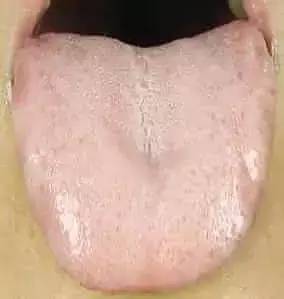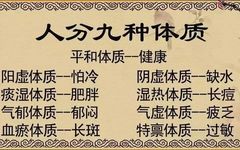
The tongue mucosa is the most sensitive organ in the human body and is the site of the most active cellular oxidative metabolism. Therefore, diseases of various systems in the body can be reflected on the tongue, hence the saying, “Changes in the tongue often accompany systemic disorders.”
Among these, changes in tongue quality can most reflect diseases, and tongue color reflects the inherent color of the organs. The changes in tongue quality and color are related to the circulation and balance of Qi and blood. Modern medicine believes this is related to blood flow rate, blood viscosity, vascular dilation and contraction, and blood volume.

The spleen opens to the mouth, and “the tongue is the external manifestation of the spleen and stomach.” The tongue coating is the result of the stomach Qi’s steaming. Therefore, the tongue coating reflects the pathology of the spleen and stomach most promptly. In modern medicine, the thickness or peeling of the tongue coating depends on the condition of the lingual papillae. Atrophy of the lingual papillae leads to peeling of the tongue coating, while excessive differentiation of keratinized epithelial cells on the lingual papillae results in a thickened tongue coating. Different body types can also affect the tongue.

1. Normal Tongue
A healthy tongue is “light red with a thin white coating.” It is spirited and flexible. When the tongue is stuck out, there is a slight gap between the tongue and the corners of the mouth; even after opening the mouth for several minutes, the tongue does not easily dry out. The sublingual veins appear light purple, indicating smooth blood circulation and good physical condition.

2. Blood Deficiency
Qi and blood are weak; the overall tongue is pale and lacks color; the tongue coating is thin; the sublingual vessels are not prominent.


3. Yin Deficiency
The tongue quality is bright red or a crimson tongue; it has little or no coating or is shiny and peeled; there is little saliva or cracks.

Note:Cracks in the tongue do not necessarily indicate Yin deficiency.
 4
4
4. Yang Deficiency
The tongue body is enlarged, pale, or has tooth marks.

5. Blood Stasis
There are black stasis points or spots on the sides and tip of the tongue, and the entire tongue quality is dark, purple, or a bluish-purple tongue; sublingual veins are varicose.

Note: The liver governs the smooth flow of Qi and stores blood, regulating emotions. Emotional distress or invasion by external pathogens can lead to prolonged liver Qi stagnation, resulting in depression or irritability, chest and rib distension, and wandering pain; Qi leads blood, and prolonged liver Qi stagnation will inevitably cause blood stasis.


This image shows a comparison of the sublingual area before and after bloodletting therapy for students of the Pulse Therapy course.
6. Qi Deficiency with Blood Stasis
Pale tongue or dark tongue quality, thin white coating; stasis spots or points may be seen on the edges and tip; or sublingual veins are engorged.

7. Phlegm-Dampness
Thick, greasy coating, slippery, or feeling of phlegm obstructing the throat, often accompanied by an enlarged tongue and tooth-marked tongue.

Note:Phlegm-dampness constitution often arises from various external or internal factors leading to dysfunction of the organ’s Qi transformation, resulting in stagnation of water and dampness, which forms phlegm and retains in the organs, further affecting their function.
8. Spleen Deficiency with Excess Dampness
The tongue is enlarged, with tooth marks on the edges, and the tongue coating is thick, white, greasy, or there may be slightly yellow phlegm at the root of the tongue.

Note:Tooth-marked tongue is often caused by the tongue body being enlarged and pressed by the teeth, so it is often seen with an enlarged tongue, mostly belonging to spleen deficiency, indicating a deficiency syndrome. If the tongue quality is moist and the coating is white, it indicates spleen deficiency with cold dampness. If accompanied by yellow greasy coating, it often indicates damp-heat phlegm obstruction.


Enjoy Life
Age is a watershed; the older we get, the more we realize that time is infinite, but life is limited. We should enjoy life and rediscover ourselves.
Waking up early in the morning, 7 o’clock is the best time, slowly getting up, giving yourself a buffer to wake from sleep. Drink a glass of water, listen to the news, and have a less greasy, greener breakfast.
Listen to crosstalk, enjoy opera, try new recipes, and make a small dish to add freshness to your life. Who says that when you get older, you shouldn’t mess around? It’s never too late to pursue the joy of life.
Play some music at home, dance and sing to relax your body and mind. Take a walk in the park with old friends, dance a little. The beauty is not only in the morning light but also in the evening sunset; enjoying the night view is also a wonderful gift of the day.
Take more breaks and don’t overwork yourself; eat and sleep on time. If you see something you like, buy it without worrying about the price; never go against the environment. Spend time with friends when you can, enjoying both sobriety and drunkenness. Earning money and knowing how to spend it makes life flavorful.
Only by enjoying life can we truly live, and the true meaning of life lies in enjoying the process; only such a life is meaningful.
Appreciate Life
Life is a flower; only by blooming can we know. The deepest gratitude is realized only after being intoxicated, and time treats you warmly as before.
Every life that comes to this world is not accidental; face the people and events in life with an ordinary heart, maintain a peaceful mind, look at life lightly, and follow your dreams.
In the vast journey, through the long years, life comes and goes, unpredictable. And people are destined to either have a beautiful encounter in the intertwined affairs of the world or to look at the waves calmly.
Meeting between people is like a flower event; the joy is in the blooming period, and the pursuit of a lifetime is the most beautiful. Whether it is friendship or kinship, cherish the present; life comes quickly and goes quietly, leaving only memories.
Some feel that time is short, while others feel that life is long. A fulfilling short life is about doing what you love. A long life is about finding your direction; people come and go, constantly searching, living in the moment, and not asking for results.

